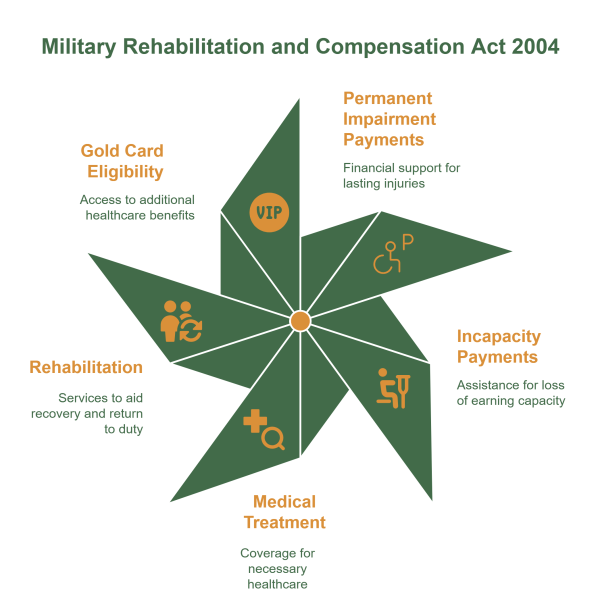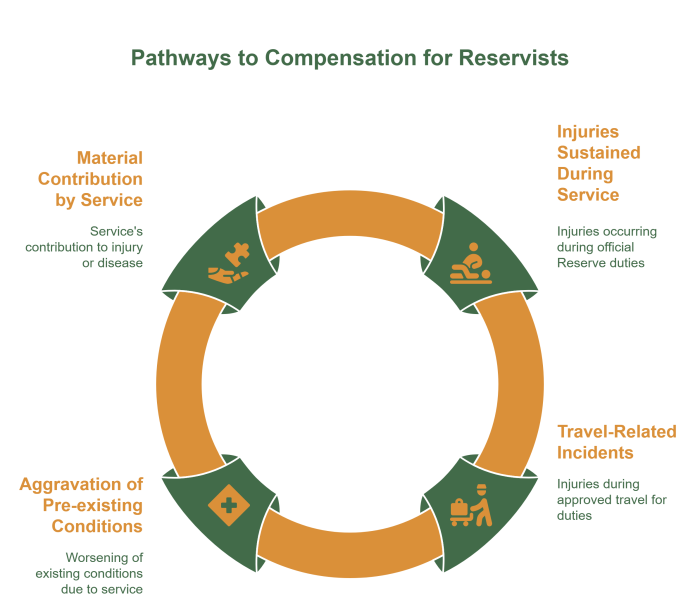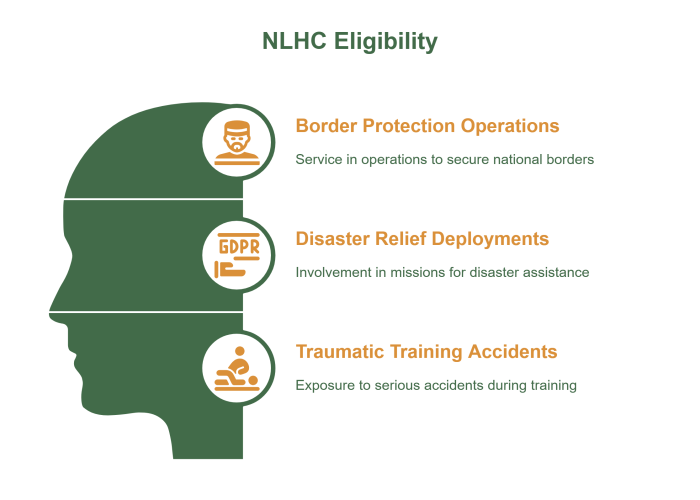They stand ready. They train hard. They deploy when called. Yet when it comes to compensation, many ADF Reservists are left asking—“Do we qualify?”
The short answer is yes, but the reality is layered with legal nuance and eligibility criteria that too often get lost in the fine print. While Reservists are an integral part of the Australian Defence Force, their entitlements under the Department of Veterans’ Affairs (DVA) are governed differently from those of full-time members.
Two major pieces of legislation determine their rights:
- The Military Rehabilitation and Compensation Act 2004 (MRCA) – for service-related incidents after 1 July 2004
- The Safety, Rehabilitation and Compensation Act (Defence-related Claims) 1988 (DRCA) – for injuries, diseases or deaths resulting from service prior to 1 July 2004
Not sure which legislation applies to you? Getting it right can make all the difference when it comes to support. Let’s break it down.
Key takeaways
- ADF Reservists can qualify for DVA compensation, but eligibility depends on how, when, and under what circumstances their service occurred.
- Claims fall under either the MRCA (post–1 July 2004) or DRCA (pre–1 July 2004). If service spans both periods, both Acts may apply depending on when the injury happened.
- Injuries or illnesses must be linked to Reserve duties, including during training, operations, approved travel, or where service materially worsened an existing condition.
- Reservists may be eligible for the same benefits as full-time ADF members, including permanent impairment payments, incapacity payments, medical treatment, rehabilitation services and Gold Card eligibility.
- Advocacy support like VetComp helps clarify entitlements, streamline paperwork, and improve claim outcomes.
Understanding Who Counts: ADF Reservists in Focus
Before diving into the legal maze, let’s get one thing straight: ADF Reservists are serving members of the ADF. They’re not “just volunteers” or “weekend warriors”—they’re trained personnel who balance their civilian lives with military service, often on short notice and under challenging conditions.
Who is a Reservist?
A Reservist is a member of the ADF Reserve Forces, typically engaged in part-time service. They can be called upon for:
- Regular training parades
- Field exercises and courses
- Operational deployments
- Humanitarian, disaster relief or border protection missions
Service Categories
Reservists fall into several categories depending on the nature and extent of their service:
- Standby Reserve
- Active Reserve
- Continuous Full-Time Service (CFTS) – when a Reservist temporarily serves in a full-time capacity
While full-time ADF members follow a clearer path to DVA benefits, things can be more complicated for Reservists, especially if their service has been part-time, irregular, or includes both peacetime and deployment roles.
Contacting an advocate at VetComp can help navigate this complexity and provide clarity around your entitlements.
Why the Confusion?
Historically, Reservists’ entitlements have often been misunderstood—not just by the public, but sometimes within the DVA itself. The overlap between civilian life, part-time military duties, and multiple legislative frameworks creates a grey area that leaves many Reservists uncertain about where they stand.
The Legal Backbone: MRCA and DRCA Explained
To understand DVA compensation eligibility, you need to know your legal landscape. Two Acts are central here
MRCA – Military Rehabilitation and Compensation Act 2004
Applies to all injuries, diseases, or deaths related to service on or after 1 July 2004.
Key Features:
- Covers full-time, part-time, and CFTS Reservists
- Includes both peacetime and operational service
- Provides access to permanent impairment payments, incapacity payments, medical treatment, rehabilitation, and Gold Card eligibility
MRCA is considered a more modern and comprehensive system, aiming to simplify the compensation and rehabilitation process for all service members, including Reservists.

DRCA – Safety, Rehabilitation and Compensation Act (Defence-related Claims)
Applies to injuries or conditions that occurred prior to 1 July 2004.
Key Features:
- Includes Reservists who were serving in any capacity before MRCA came into effect
- Offers similar entitlements, but with some procedural and coverage differences compared to MRCA
- Administered under slightly different rules, often requiring more supporting evidence or documentation
Crossover Scenarios
What if a Reservist served both before and after July 2004?
Good question.
In these cases, both Acts may apply, depending on when the injury or illness happened. That’s where things can get a little tricky. Navigating which benefits you’re entitled to can be confusing, which is why many Reservists turn to advocacy services or compensation support officers for help.
Need guidance? The team at VetComp is here to support you
When Are Reservists Eligible? Conditions That Trigger Compensation
ADF Reservists aren’t automatically entitled to DVA compensation just by donning the uniform. To qualify, their injury, illness or condition must be linked to their service in specific ways. Here’s when the green light turns on:
- Injuries sustained during service: If the injury occurred while performing Reserve duties—such as during training, exercises, parades, or official camps—it may be deemed service-related.
- Travel-related incidents: Compensation may apply if the injury happened while travelling to or from an approved duty location or commuting between home and the site of Reserve activities
- Aggravation of pre-existing conditions: If Reserve service has worsened an existing medical issue—physical or mental—it can be considered compensable.
- Material contribution by service: Even if service wasn’t the sole cause, any material contribution made by Reserve duties to an injury or disease can qualify the Reservist for compensation.

In short, if your Reserve service contributed to your condition, DVA needs to consider it. But navigating the system isn’t always simple. Speak with one of our advocates to see how VetComp can help you get your service recognised—and the compensation you’re entitled to.
What’s in the Benefits Basket?
ADF Reservists who meet eligibility criteria can access many of the same benefits available to full-time personnel. Here’s what you may be entitled to:
A. Permanent Impairment Payments
Reservists with accepted service-related injuries or illnesses may be eligible for lump sum payments or ongoing compensation if a medical assessment confirms a certain level of permanent impairment. These payments recognise the lasting physical or psychological impact of your service.
B. Incapacity Payments
Incapacity payments are designed to replace lost earnings when a Reservist can’t work due to a service-related condition. For Reservists, the calculation includes civilian income (pre-injury) and reserve pay. These payments ensure Reservists aren’t financially disadvantaged due to their service-related injuries.
Two scenarios:
- Part-time service injury → Income = Civilian wage + Reserve income
- Continuous full-time service injury → Income = Full-time ADF equivalent pay + allowances
C. Medical Treatment
Once your condition is accepted as service-related, DVA will cover all reasonable medical costs linked to it. Even if you’re no longer serving, you’re still entitled to treatment. This can include surgeries, specialist care, medication, allied health services and more, without any out-of-pocket expenses.
D. Rehabilitation and Vocational Support
Rehabilitation goes beyond physical recovery. When holistic, well-rounded rehabilitation is offered, it provides Reservists with the opportunity to balance their careers with their civilian lives, which can be a lifeline during challenging recovery periods. It can cover:
- Vocational counselling
- Education or retraining
- Assistance with returning to work or transitioning careers
E. Gold Card Access
The DVA Gold Card offers free access to all clinically necessary healthcare covered under Medicare. It’s designed to provide ongoing support, particularly in later life or for those managing complex medical conditions.
Eligibility for Reservists:
- Permanent impairment assessed at 60 points or more
- Specific compensation or pension circumstances
📩 Our DVA advocates are experts in helping veterans achieve the maximum compensation they are entitled to as a result of their service, including access to the Gold Card and rehabilitative support.
What About Their Families? Compensation for Dependants
ADF service doesn’t just affect the Reservist—it affects their family. If a Reservist’s death is linked to their service, dependents may be eligible for a range of support options.
Here’s what may be available:
- Funeral Expenses: DVA may reimburse the full or partial cost of funeral services, including transport, burial/cremation fees, and memorial arrangements.
- Ongoing Financial Support: Dependants (such as a spouse or children) may receive income support or compensation under Permanent Impairment entitlements and/or Special Rate Disability Pension (SRDP) frameworks
The system recognises the pressure families face after a loss and aims to provide practical, ongoing support when it’s needed most.
The Grey Zone: Non-Liability Health Care Access
All full-time ADF members automatically qualify for free mental health care through the Department of Veterans’ Affairs, no matter the cause. For Reservists, though, the rules are tighter.
To access Non-Liability Health Care (NLHC) as a Reservist, you’ll need to have served in certain circumstances, including:
- Border protection operations
- Disaster relief deployments
- Exposure to serious or traumatic training accidents

For many Reservists, particularly those engaged in domestic or low-risk activities, these criteria effectively exclude them from accessing this critical mental health support.
Why is this a problem?
- Mental health challenges don’t discriminate between part-time and full-time service.
- Reservists may still experience trauma, stress, and emotional toll from service, even without formal deployment.
- The gap creates a two-tier system that can leave part-time service members vulnerable and unsupported.
This remains a contentious area, and one where greater advocacy may eventually lead to more equitable access. Let VetComp assist you, book in for a consultation with our advocacy team.
Know Your Rights And Receive Support Today
If you’ve served, and your service contributed to an injury, illness, or condition, then yes, you have a right to DVA compensation. That said, eligibility hinges on how, when, and in what capacity you served.
Many Reservists are unaware of what they’re entitled to—or are deterred by confusing criteria and paperwork. That’s why recording your service history, maintaining medical documentation, and staying informed are so crucial.
You Don’t Have to Navigate This Alone
Claiming what you’re owed shouldn’t feel like a battlefield. Take these next steps:
- Contact DVA directly to ask about your situation.
- Use online calculators and service eligibility tools to get a snapshot of potential benefits.
- Speak with a VetComp advocate because we understand the nuances of Reserve entitlements.
You’ve stood ready to serve your country—make sure the system stands ready to serve you.
FAQs
We’ve gathered our most commonly asked questions here, so you can feel informed, at ease, and ready to take the next step toward the support and benefits you deserve.
Can ADF Reservists lodge a DVA claim while still serving?
Yes. Reservists can lodge a claim for compensation or medical treatment while actively serving in the ADF, including during Continuous Full-Time Service (CFTS). There’s no need to wait until discharge to seek support.
Do Reservists need a medical certificate to make a claim?
Yes. A current medical certificate that supports the claimed condition is typically required when submitting a DVA compensation claim, especially under DRCA. The certificate should outline the diagnosis and its link to Reserve service.
Are Reservists eligible for the White Card?
Reservists may be eligible for a White Card if they have an accepted condition under DVA or qualify through specific mental health eligibility pathways. The card grants access to treatment for the accepted condition(s).
Can a Reservist receive both a civilian salary and DVA incapacity payments?
Yes—up to a capped amount. Incapacity payments are designed to supplement lost income, not double-dip. If a Reservist partially returns to civilian work, payments may be adjusted based on actual earnings.
Are Reservists covered during voluntary or unauthorised duties?
Generally, no. Coverage under DVA compensation schemes applies only to authorised Reserve duties. Injuries sustained during unofficial or unsanctioned activities may not be eligible for benefits.
Can Reservists access DVA home or car modifications?
Yes—if their accepted service-related condition significantly affects mobility or daily living. These benefits are usually coordinated through a DVA rehabilitation plan and require supporting medical documentation.



